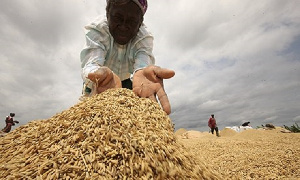 Ghana imports more than US$350million worth of rice annually from countries including the USA
Ghana imports more than US$350million worth of rice annually from countries including the USA
The Ghana Rice Interprofessional Body (GRIB) has said it is negotiating with foreign companies to access financial support and drive the needed technological investment into cultivation of the cereal.
The association maintains that high-interest rates on local loans to rice farmers, and the low technology involved in cultivation of rice in Ghana, are curtailing the fortunes of local producers.
GRIB is currently negotiating with foreign entities to help acquire combine harvesters, machinery and the needed logistics and finance to assist its farmers. “We have one foreign company responding to our request, and is ready to give combine harvesters to support us. We need about 100 of such nationwide to support the over-40,000 farmers in our fold,” President of GRIB, Nana Kwabena Adjei Ayeh II, told the BFT.
Nana Kwabena Adjei Ayeh said the lack of technology to improve production, lack of land development and lack of dams for irrigation are also curtailing mass production of rice for domestic consumption – giving impetus for imported rice brands to thrive on the local market.
For now, the current status of government’s pledge to provide each district with an irrigation dam to support smallholder and large-scale agriculture remains unknown, as the agenda seems to be heading nowhere.
Ghana imports more than US$350million worth of rice annually from countries including the USA, Vietnam, Thailand among others. The amount, food analysts say, could double in the next three years.
While local banks have remained indifferent toward financing rice farmers across the country, with high-interest rates on loans – beyond 30 percent, the phenomenon according to the organisation is escalating the country’s foreign rice import bill, as local producers cannot meet demands for such facilities.
Nana Kwabena Adjei Ayeh said the expensive nature of rice farming, coupled with equipment and machinery for cultivation, means that farmers must have regular access to financial support for the venture.
Meanwhile, the association’s appeal to government to set up interest-free loan schemes for local rice producers in order to sustain the venture keeps falling on deaf ears. With the apathetic attitude of banks toward financing the sector due to the high-interest rates, GRIB maintains that an interest-free loan scheme would whip-up enthusiasm for cultivation.
A research report on consumable goods, conducted by Konfidants, has indicated that about 94 percent of rice sold in Ghana is imported.
The association however fears that the foreign rice influx could further rise, as there is no quota system regulating imports and with local producers lacking the capacity to meet demand.
GRIB, an association of more than 40,000 smallholder farmers, has been updating and registering new members, documenting membership addresses and location of its farmers nationwide.
Indeed, renting a bulldozer for digging a dugout for irrigation purposes is expensive and costs about for GH¢3,000 daily rent. The smallholder farmers cannot afford such expenses, much less raising finance for land development, purchasing modern rice-mills or the gut to purchase combine harvesters.
“About 98 percent of smallholder farmers lack this machinery and the financial capacity to afford them,” Nana Kwabena Adjei Ayeh indicated – justifying his appeals by saying, “This is why government must support us with the loan scheme because we have the documentation of our farmers and it is easy to monitor and track them to recoup whatever investment is made.”